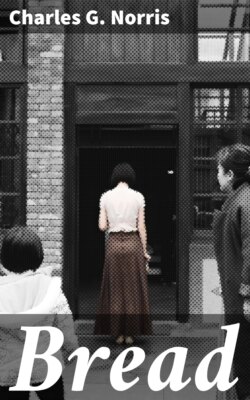Читать книгу Bread - Charles G. Norris - Страница 9
На сайте Литреса книга снята с продажи.
§ 5
ОглавлениеShe watched them affectionately now as they finished their dinner, observing her older daughter’s fastidious manipulation of her fork, the younger one’s birdlike way of twisting her small head as she ate. A fleeting wonder of what the future held in store for each passed through her mind. Jeannette was the more impetuous, and daring, was shrewd-minded, clear-thinking, efficient, was headstrong, and actuated ever by a suffering pride; she would undoubtedly grow into a tall, beautiful woman. Alice,—her mother’s “brown bird,”—seemed overshadowed by comparison and yet Mrs. Sturgis sometimes felt that Alice, with her simpler, unexacting, contented nature, her gentle faith, her meditative mind, was the more fortunate of the two. She, herself, turned to Jeannette for advice, for discussion of ways and means, and to Alice for sympathetic understanding and uncritical loyalty. They were both splendid girls, she mused fondly, who would make admirable wives. They must marry, of course; she had brought them up since they were tiny girls to consider a successful, happy marriage as their outstanding aim in life; she had trained them in the duties of wives, even of mothers, but she shuddered and her heart grew sick within her as she began dimly to perceive the time approaching when she must surrender their bloom and innocence and her complete proprietorship in them to some confident, ignorant young male who would unhesitatingly set up his half-baked judgment for his wife’s welfare against her hard-won knowledge of life. Yet both girls must marry; her heart was set on that. Marriage meant everything to a girl, and to the right husbands, her daughters would make ideal wives.
With the speed of long practice, the remains of the dinner were swept away and the kitchen set to rights. Both girls attempted to dissuade their mother from performing her customary dish-washing task, urging her that to-night she must rest. But Mrs. Sturgis would not listen; she was quite rested, she declared, and there was nothing to washing up the few dishes they had used; why, it wasn’t ten minutes’ work! She invariably insisted upon performing this dirtier, more vigorous task; Alice’s part was to wipe; Jeannette’s to clear the table, brush the cloth, put away the china and napkins, and replace the old square piece of chenille curtaining which had for years done duty as a table cover. Then there was the gas drop-light to set in its center, and connect with the gaselier above by a long tube ending in a curved brass nozzle that fitted over one of the burners. Where this joining occurred, there was always a slight escape of gas, and it frequently gave Mrs. Sturgis or her daughters a headache, but beyond an impatient comment from one of them, such as “Mercy me! the gas smells horribly to-night!” or “Open the window a little, dearie,—the gas is beginning to make my head ache,” nothing was ever done about it. It was one of those things in their lives to which they had grown accustomed and accepted along with the rest of the ills and goods of their days.
Mother and girls used the dining-room as the place to congregate, sew, read or idle. They rarely sat down or attempted to make themselves comfortable in the spacious front room. It was not nearly so agreeably intimate, and they felt it must always be kept in order for music lessons and for rare occasions when company came. “Company” usually turned out to be a pupil’s mother or a housemaid who came to explain that little Edna or Gracie had the mumps or was going to the dentist’s on Saturday and therefore would not be able to take her lesson, or a messenger from Signor Bellini to inquire if Mrs. Sturgis could play for one of his pupils the following evening. Such was the character of the callers, but the fiction of “company” was maintained.
The group Mrs. Sturgis and her daughters made about the dining-room table in the warm yellow radiance of the drop-light was intimately familiar and dear to each of them. There was always a certain amount of sewing going on,—mending or darning,—and hardly an evening passed without one or another industriously bending over her needle. Usually they were all three at it, for they made most of their own clothes. Each had her own particular side of the table and her own particular chair. They were extremely circumspect in the observance of one another’s preferences, and would apologize profusely if one happened to be found on the wrong side of the table or incorrectly seated. Mrs. Sturgis, on the rare occasions when she found herself with nothing particular to do, spread out a pack of cards before her and indulged in a meditative solitaire; Alice had always a novel in which she was absorbed. Generally three or four books were saved up in her room, and she considered herself dreadfully behind in her reading unless she had disposed of one of them as soon as she acquired another. Jeannette studied the fashions in the dress magazines and sometimes amused herself by drawing costume designs of her own.
But dressmaking occupied most of the evenings. There was usually a garment of some kind in process of manufacture, or a dress to be ripped to pieces and its materials used in new ways. Alice acted as model no matter for whom the work was intended. She had infinite patience and could stand indefinitely, sometimes with a bit of sewing in her hands, sometimes with a book propped before her on the mantel, indifferent and unconcerned, while her mother and sister crawled around her on the floor, pinning, pulling and draping the material about her young figure, or else sitting back on their heels and arguing with each other, while they eyed her with heads first on one side, then on the other.
